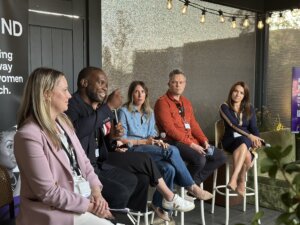The technology sector’s approach to gender diversity has reached a critical juncture. On 23rd July, La Fosse launched UNBOUND, our reimagined initiative to tackle systemic barriers facing women in tech, with an evening of honest conversation and actionable insights at The Conduit in London.
Unlike traditional women in tech events, UNBOUND brought together both male and female voices to move beyond performative initiatives toward genuine change. The panel discussion, featuring senior leaders from across the tech ecosystem, delivered practical takeaways that every organisation can implement.
Lucy Kemp: from personal mission to industry impact
Lucy Kemp, La Fosse’s Director of Brand, opened the evening with a question that cuts to the heart of the issue: “Why are we still talking about this in 2025?” Before joining La Fosse, Lucy ran her own consultancy focused on making workplaces better for women. Her motivation is deeply personal – she has a nine-year-old daughter, and her goal is to ensure the next generation has a better work life than she’s experienced.
“The things we’re going to talk about tonight are things I probably spoke about 22 years ago,” Lucy reflected. “Although it feels more pressured that we fix things, the good news is we have more data now. We understand what is happening, we understand how to fix it, and we understand why it’s important that we do so.”
 Lucy’s Women at Work Blueprint, based on conversations with over 1,700 women in technology, revealed a sobering truth: the fundamental challenges haven’t changed significantly in twenty years. Women continue to leave the industry at critical mid-career stages, not because they lack capability or ambition, but due to systemic barriers that prevent them from thriving.
Lucy’s Women at Work Blueprint, based on conversations with over 1,700 women in technology, revealed a sobering truth: the fundamental challenges haven’t changed significantly in twenty years. Women continue to leave the industry at critical mid-career stages, not because they lack capability or ambition, but due to systemic barriers that prevent them from thriving.
Actionable change: Leaders can start by actively mentioning women’s names in senior meetings and putting them forward for high-visibility projects. As Lucy emphasised, “Sometimes the simplest actions have the greatest impact.” Create a systematic approach to ensure women are considered for stretch assignments, board presentations, and client-facing opportunities.
The three pillars of women’s workplace priorities
Lucy’s Women at Work Blueprint research identified three consistent priorities that women expressed across all demographics:
Earning fairly: Women weren’t receiving equal compensation or advancement opportunities compared to their male counterparts. Lucy explained that women were “getting passed over promotions, or their male counterparts were being paid more than them.”
Learning continuously: Access to professional development and career progression support remained unequal. As Lucy noted, women “weren’t able to access the same level of learning support. They weren’t able to push their careers forward.”
Living authentically: Work-life integration needed genuine personalisation, not one-size-fits-all flexibility policies. “The work life balance didn’t work for them anymore. It wasn’t personalised. We think it’s flexible. It’s not. It’s the one size fits all.”
These findings held true across generations, from Gen Z to senior professionals, highlighting how fundamental these needs are to creating inclusive workplaces.
Download here
Sabina Heywood: redefining strength in male-dominated spaces
Sabina Heywood‘s career journey from International Mission Operations at Anduril is as unconventional as it is inspiring. Starting as a classical musician with seven years of orchestral training, she transitioned to the Royal Air Force as a musician before moving into special intelligence – an environment with less than 5% female representation.
“It was very, very challenging,” Sabina shared candidly. “I entered into a world where I was absolutely told to speak louder, have a lower voice, conduct myself more like a man. I wouldn’t wear a dress like this – I wore black. My water bottle was black. You couldn’t tell anything about my personality.”
However, Sabina’s most powerful insight came from reframing how women’s natural strengths are perceived. Rather than trying to conform to male behaviours, she advocates for recognising women’s emotional intelligence as a competitive advantage.
“How often have you been in a meeting where you’ll lock eyes with another woman in the room and you know everything that’s going on?” she asked. “You know the strategy, you know where that CEO is going with everything they’re saying. Because we’ve got that underlying ability to navigate relationships.”
Sabina also shared a compelling example of effective diversity practices from her current role. She was specifically headhunted because the hiring manager told the team to “bring me one female” to achieve cognitive diversity. While initially questioning whether she was hired solely for being a woman, she recognised the power of this approach when implemented with rigorous selection processes.
“The hiring manager and the team kept saying, ‘this is why we need to do it. If you keep having the same people do the same mission, of course we all know the power of cognitive diversity,'” she explained.
Actionable change: Before recruiting for senior roles, mandate diverse candidate pools and explicitly communicate the value of cognitive diversity to hiring teams. Train managers to recognise and value different leadership styles, particularly women’s strengths in emotional intelligence and relationship building, rather than expecting everyone to conform to traditional masculine leadership models.
The critical mid-career gap
Hannah Thompson, La Fosse’s Chief People Officer, identified the mid-career exodus as a crucial area requiring immediate attention. It’s not just junior talent or C-suite representation that needs focus – it’s the experienced professionals in the middle who are leaving the industry entirely.
 The panel discussed “Anna’s story” – a composite case from our research representing countless women who’ve invested years building careers only to abandon them due to systemic barriers. Anna now works outside the tech industry entirely, her talent and potential lost forever to both her former employer and the sector as a whole.
The panel discussed “Anna’s story” – a composite case from our research representing countless women who’ve invested years building careers only to abandon them due to systemic barriers. Anna now works outside the tech industry entirely, her talent and potential lost forever to both her former employer and the sector as a whole.
This middle group represents the greatest opportunity for retention strategies that could transform the industry’s talent pipeline.
Actionable change: Create targeted support programmes for mid-career women, including career coaching, leadership development opportunities, and regular check-ins about career progression. Implement “stay interviews” to understand what would make experienced women remain and thrive, rather than waiting for exit interviews when it’s too late.
Male allyship: beyond performative support
John Musk, Product Director at Haven Group, demonstrated what authentic allyship looks like. Before joining the panel, he consulted his predominantly female team about the questions he’d be addressing. This led to what he described as “the best conversation I’ve had with my team” about gender equity in tech.
His next step? Taking these discussions to his broader organisation of 170 people. This approach – consulting with women before speaking on their behalf and using those insights to drive wider organisational change – provides a blueprint for other male leaders.
Actionable change: Male leaders should regularly consult with female colleagues before making decisions that affect gender diversity initiatives. Create formal advisory groups of women across different levels and functions to guide policy decisions, and commit to acting on their recommendations rather than just seeking input.
The unconscious bias challenge
Glyn Blaize, La Fosse’s COO, highlighted how unconscious bias continues to create daily barriers for women. From being interrupted more frequently in meetings to having their ideas attributed to male colleagues, these seemingly small incidents compound to create significant career impediments.
The panel stressed that addressing bias isn’t about individual blame but about creating systems that recognise and counteract these patterns systematically.
Actionable change: Implement meeting protocols that actively track speaking time and idea attribution. Designate meeting facilitators to ensure equal participation, and create formal processes for recording who contributes which ideas. Train leaders to recognise and interrupt bias in real-time, such as stopping interruptions and redirecting credit where it’s due.
Practical steps for immediate impact
The evening concluded with concrete actions organisations can implement immediately:
Advocate actively: Lucy Kemp emphasised the power of mentioning women’s names in leadership meetings and putting them forward for high-visibility projects. Sometimes the simplest actions have the greatest impact.
Listen authentically: Organisations must move beyond assuming their current flexible working policies meet everyone’s needs. True flexibility requires understanding individual circumstances and adapting accordingly.
Create psychologically safe spaces: Women need environments where they can contribute without fear of being overlooked or having their ideas appropriated.
Address the middle: Focus retention strategies on mid-career professionals who represent the greatest risk of industry exodus.
The business case for change
The panel was clear: this isn’t just about doing the right thing. Companies that actively invest in retaining female talent will see higher engagement, innovation, and long-term success. The cost of inaction is high – businesses that fail to adapt risk losing top talent to competitors who create more inclusive environments.
UNBOUND’s ongoing commitment
The launch event marks the beginning of a bi-monthly series focused on actionable conversations around diversity in tech. Our upcoming mentorship programme, launching in September 2025, will connect experienced leaders with rising stars, career changers, and emerging talent.
We’re also developing targeted internship programmes and webinar series to address the pipeline challenges identified in our research.
Key takeaways for tech leaders
 The evening’s discussions can be distilled into several crucial insights:
The evening’s discussions can be distilled into several crucial insights:
Data drives action: Understanding the specific barriers women face in your organisation is the first step toward removing them.
Allies need tools: Well-intentioned support must be backed by practical knowledge and specific actions.
Systems thinking works: Individual efforts, while valuable, must be supported by organisational systems that embed inclusive practices.
The middle matters: Mid-career professionals represent both the greatest risk and the greatest opportunity for meaningful change.
Authenticity trumps performance: Genuine conversations and honest acknowledgement of challenges are more valuable than polished diversity initiatives.
Looking forward
The technology industry stands at a crossroads. We can continue having the same conversations about gender diversity while making minimal progress, or we can implement the practical solutions we know work.
UNBOUND represents La Fosse’s commitment to the latter approach. By bringing together diverse voices, sharing honest insights, and focusing on actionable solutions, we’re building a movement that prioritises meaningful change over comfortable conversation.
The path forward requires courage from leaders, authenticity from organisations, and persistence from everyone committed to unleashing the full potential of women in technology. This evening proved that appetite for change exists across the industry – now it’s time to channel that energy into sustained action.
To access our exclusive Women at Work Blueprint research and join the UNBOUND community, visit our dedicated UNBOUND page. Our next event will be announced shortly, focusing on mentorship and career development strategies that actually work.
